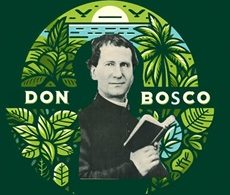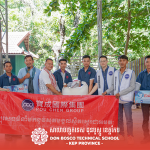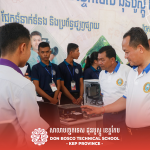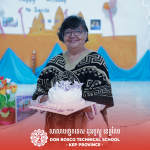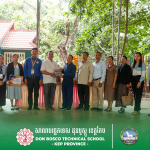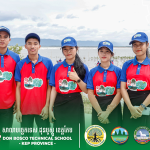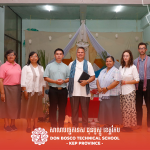We envision a quality integral technical education with care for the environment, especially to those who are at most economical disadvantage, in the spirit of the Preventive System of Saint John Bosco to facilitate social integration and contribution to Cambodian development starting in their families, society and country.
Thus, we commit ourselves to the formation of the mind and heart of the youth with role modeling, capacity building and discipline, standardization with creativity and innovation, self-learning and women empowerment, child and young adult protection, and self-sustainability.
For more information, visit the official website of Don Bosco Cambodia.
History of Don Bosco Kep
1999. The Salesians requested the Providence Sisters of France to transfer the rights to use the old Providence College of Kep City, abandoned during the war, to Don Bosco Foundation of Cambodia. The building was located in front of the Benedictine Monastery, that was then the Aspeca Orphanage near the Crab Market. However, the Sisters rejected the request. The old college was demolished in January 2012, and now in its place is a luxury hotel.
In 1999. Kep City was almost deserted and still a municipality of Kampot Province. Br. Panetto saw it as a potential for future educational projects and secured three hectares of land two kilometres to the North of the old Providence Sisters College. The land is located between National Road 33A and Kep Bay.
A group of sponsors funded the construction of some initial buildings:
- The Hatrans Company of Netherlands funded the construction of a building for a sewing school.
- The Don Rua Youth Centre was funded by the People of Belgium as a place for meetings and hosting groups coming from other Don Bosco schools and other provinces.
- The Staff House (Salesian House) was funded by the Sawasdee Foundation among other sponsors.
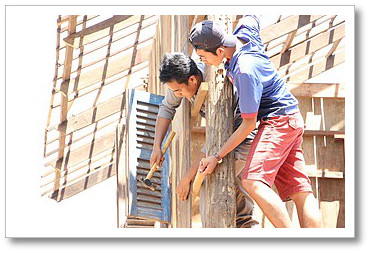
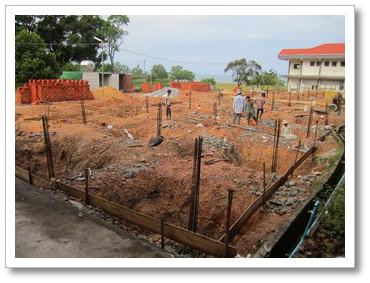
2000. The school opened as a sewing program for girls from the region directed by Mrs. Vanny and Mrs. Sina. Groups of children and youth from Poipet, Phnom Penh, Battambang, Sihanoukville and nearby provinces used the place for trips and meetings.
2010. There were already proposals to develop Don Bosco Hatrans Kep as a bigger project for the people in the region. Fr. Samnang (Albeiro Rodas) did a study on the region, including Kampot and Takeo. He found that 50% of the technical students at Don Bosco Sihanoukville came from these three south eastern provinces. The study concluded the following:
- There was a lack of technical and professional centres for the youth to continue professional or skills education.
- Many young people emigrated to Phnom Penh, Sihanoukville and Thailand from these provinces.
February 2011. The Cambodian Salesian Council (CSC) approved the project to develop Don Bosco Hatrans Kep as a technical school. Since 2000 the project was under the administration of Don Bosco Phnom Penh, but it was transferred to the administration of Don Bosco Sihanoukville under the guidance of Fr. Ly Samnang (Albeiro Rodas.)
October 2011. The Technical School opened with 40 students studying social communication and journalism, hospitality or tailoring. Fr. Samnang was appointed as the rector and leader of the centre.
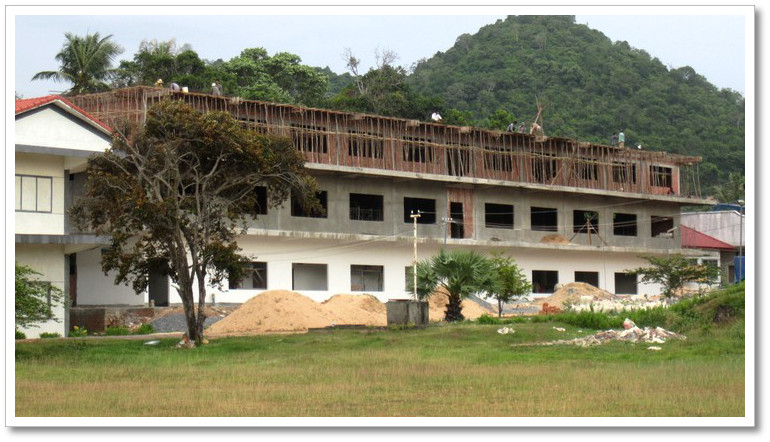
November 2011. A group of donors visited the centre and approved funding for the construction of the Angkor Borei Center Building and the installation of a solar plant. Construction began in December 2011. The beginning was very difficult for students and teachers working without good facilities, but the construction process gave us a lot of experience and joy. Work was done to adapt the old buildings and foreign volunteers also came to support the work as educators and administrators.
October 2012. The Electrical and Information Technology Departments started their courses. The Peace Centre was built for the Electrical and Tailoring Departments.
March 2013. The Ministry of Education inaugurated Don Bosco Technical School as the centre for providing technical training to young people from the region.
After months of waiting for work to be completed, the official opening of the Don Bosco Technical School in Kep City took place from 5 – 7 March. Donors and government representatives came to the event. Local Muslim and Buddhist communities also played a part in the opening ceremonies.
On Tuesday a delegation from the Cham ethnic community, mostly Muslim, gave a blessing to young Cham students attending the centre.
On Wednesday Buddhist monks blessed the school following Buddhist tradition.
Finally on Thursday the Vicar Apostolic of Phnom Penh, Archbishop Oliviere Schimitthaeusler blessed the complex. The Minister for Education, Sport and Youth, the Hon. Im Sethy, and Governors from Kep, Kampot and Takeo provinces attended this final ceremony. Thousands of students from schools around Kep province also attended.
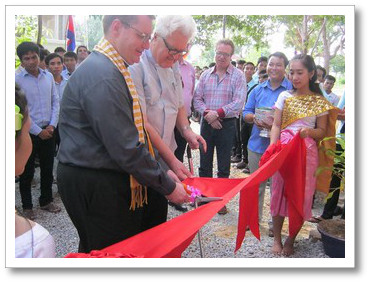
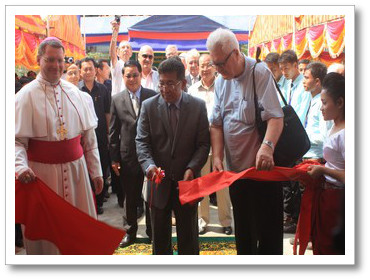
October 2013. Three new sections were created – agriculture, art communication and office administration, and two new skills, culinary and food & beverage were added to hospitality.
Over time Don Bosco Technical School in Kep has evolved. In the beginning it was a simple rural centre where the Salesians and students would come for retreat. Gradually it became a small sewing school. Now, it offers a wide range of educational activities and classes.
The first beneficiaries were the less fortunate young people who had difficulty in finding employment.
At Kep, the Salesians in Cambodia have decided to focus mainly on intellectual skills and the service areas, hence they now run courses such as Media Communication, Information Technology, Electrical, Secretarial Science and Hospitality & Tourism.
After graduating the students can find work more easily in their own province. If they choose to work in big cities like Phnom Penh, they are qualified to compete with others and be less marginalised.
Development Goals
Millennium Development Goals
The development of the Don Bosco Technical School is in accordance with the national and international criteria of development, especially the Millennium Development Goals (MDGs) that have been adopted by the United Nations, IMF, OECD, and the World Bank.
Don Bosco Kep, as an educational project for Cambodian children and youth, has chosen the following areas from the MDGs:
Eradicate Extreme Hunger and Poverty
Don Bosco Kep works toward this goal through projects such as Technical Education and the Children Fund. Technical skills give opportunities to young people to get better paid jobs to support their families and thus break the cycle of poverty. Also to combat malnutrition the school canteen aims to serve good food to the students.
Achieve Universal Primary Education
The Don Bosco Kep Children Fund (DBKCF) works to prevent school abandonment by children from very poor families or vulnerable communities. One of its goals was opening a kindergarten in 2014 that should also be a model of child education in the region and this is now fully operational. The DBKCF also works to help teachers with their own financial difficulties to avoid the common practice of charging students extra fees to make more income for themselves. Basically, this practice violates the right of free primary education. The low salaries of teachers in Cambodia is one reason for such practice.
Promote Gender Equality and Empowerment of Women
Since opening in 2011, Don Bosco Kep has engaged young women in all its technical programs, including those that people think are only for men, such as electrical work. The construction of the female hostel, Banteay Srei, has the objective of creating a safe and practical place for young women from the region to stay, giving them the same opportunity as their male counterparts. At the same time, DBKCF supports equal number of girls and it is looking forward to supporting single mothers (widows or abandoned women) and grandmothers through health assistance and/or learning skills such as sewing and counselling. Don Bosco ensures that empowering women should not mean the abandonment of their kids, but give equal opportunities to both genders since there is evidence that preference for one gender leads to social clashes.
Goals by Promotion
Other goals such as reducing child mortality, improve maternal health, fighting HIV/AIDS,
Malaria and other diseases are included in the projects of the Social Communication Centre where audio visual and printed material are produced to distribute to rural communities for prevention and education. At the same time the students gain knowledge about all these problems and become advocates in their own communities.
Ensure Environmental Sustainability
Don Bosco Kep is especially focused on environmental sustainability. The campus itself has been designed as a park, taking care of local trees and plants, and including their study in the youth and children’s curriculum. The solar plant installation which powers the campus is a model of energy sustainability in the region and many groups come to study it, as well as the water supply and water treatment systems. See Green Campus, the Don Bosco Jungle-Garden Campus.
Child and Youth Protection
Don Bosco Kep is an academic community of students and teachers committed to improve living conditions through education and formation of the young for the best of their communities and their country.
In this sense, we work for the dignification of children and youth, preventing any form of harm, exploitation and social disadvantage.
We follow the policies of Don Bosco Cambodia for the care and protection of children and young adults. Within our policies, any adult (employee, religious, volunteer, young adults and visitors) should sign the child and young adults protection policy.
Policy for the protection of children and young adults inside Don Bosco Kep that should sign by any adult that is working, studying or visiting Don Bosco Kep. Since February 2024, this condition is included in the employee contract and in the inscription agreement of each student and employee:
Click Don Bosco Children Fund for more information.
Gender Equality
Gender equality is more than a goal in itself. It is a precondition for meeting the challenge of reducing poverty, promoting sustainable development and building good governance.
– Kofi Annan
- In Don Bosco Kep we believe in the following principles about gender equality: Boys and girls should be educated in the same place with the same rights and duties because humanity is only one, we all walk on the earth with the same dreams for better societies, peace, love and care for our home planet. When boys and girls study together, they become tolerant and respectful of each other and learn how to work in teams without gender preconceptions.
- The ancestral Cambodian culture is matriarchal. It is in the Cambodian blood. The first monarch of Cambodia was a woman, the daughter of the Dragon-King, who married an Indian Brahman, Kundian. It is the woman that runs the domestic economy with the help of her husband, who usually gives her all his money.
- We believe that gender equality does not mean giving all priority to girls and women and discriminating against males. Such an approach would not be gender equality, but it would move the problem to the male side. Ignoring boys and young men just because they are males and can get better opportunities by themselves does not solve the problem and on the contrary could worsen it. Boys and young men without education means insecurity, crime and domestic violence. Males are also potential victims of many kinds of abuse, including human trafficking and slavery. Besides, we know that a good gift for a woman’s life is a good man, so we keep our compromise of educating boys and young men to be good people as well.
For these reasons, we adopt the following policies in our Technical School for gender equality education
- All technical sections are open to both genders, including sections that are traditionally associated to one gender in Cambodia. We do not follow rules like engineering for men and secretarial for women.
- Teachers, instructors and volunteers are educated in gender equality principles, not discriminating against either sex in any academic, sports or cultural activities.
- We don’t discriminate against teachers and students that have preferences for their own gender, respecting their sexual preferences whether they are kept private or made public. People with same sexual preferences must follow the same duties and responsibilities inside the school, using uniforms as others and not claiming special conditions or treatment.
- We work to prevent bullying of any kind inside and outside the school.
Physical Challenged Students
Don Bosco Kep is an accessible school for young people and children, especially those who are vulnerable or in social disadvantage. For this reason, we welcome children and young people who are physically challenged.
